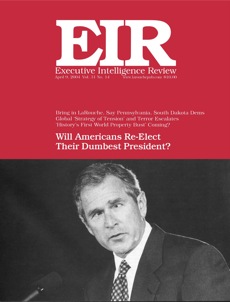Will Americans Re-Elect Their Dumbest President?
His Only Endearing Young Charm
by Lyndon H. LaRouche, Jr.
“The leading political issue of 2004—after the onrushing depression, that is—is the question: are the U.S. voters so silly that they would re-elect a President whose one and only endearing charm, is that he is rightly perceived, more or less world-wide, as the dumbest man in the history of the Oval Office?”
Clarke Makes the Case: Vulcans Control Dumb Bush
by Edward Spannaus
Beyond the media’s “al-Qaeda or Iraq?” headlines, counter-terrorism official Richard Clarke’s book and words show a President under the neo-cons’ spell and control, particularly that of a vice president with power no vice president has had before.
Cheney: He Can Run, But He Can’t Hide
by Jeffrey Steinberg
Ahmad Chalabi’s Bay of Goats
by Michele Steinberg
Are Sharon’s Troubles Harbinger for Bush?
by Michele Steinberg and Nancy Spannaus
European Governments Falling Left and Right
by Rainer Apel
American Culture
We Must Exit the Suicide Club: How the Counterculture Ushered in Fascism
by Michelle Lerner
Michelle Lerner of the LaRouche Youth Movement investigates the perverse character of American society, as seen through “Industrial Music” and other Satanic expressions that emerged out of the Futurists, Theodor Adorno, and Aldous Huxley.
Strategic World Map
Synarchist ‘Strategy of Tension’ and Terror
U.S. ‘Reform’ Sabotages Arab League Summit
by Muriel Mirak-Weissbach
Taiwan: Election Stolen To Provoke a Crisis?
by Leni Rubinstein
Kirchner Walks Into Trap Of Argentine Synarchists
by Cynthia R. Rush
France: Neo-Cons’ ‘Perben Law’ Is Police-State Step
by Christine Schier
Strategy of Tension
Terror’s Legacy: Schacht, Skorzeny, Allen Dulles
by Michael Liebig
Part 1 of a series by Michael Liebig, investigating the Synarchist financial oligarchy, which, under conditions of economic and financial crisis, intends to establish a permanent “state of emergency” managed by authoritarian, or even fascist, forms of government.
Strategy of Tension: The Case of Italy
by Claudio Celani
Part 3 of a series by Claudio Celani, following the trail from the assassination of former Prime Minister Aldo Moro in 1978, through the Bologna train station bombing of 1980. Why is it that the real culprits have never been brought to justice?
Economics
Is ‘History’s First Global Property Bust’ Coming Soon?
by Lothar Komp
Representing a combined financial asset value of roughly $50 trillion in the OECD countries—for the moment holding up a private debt mountain of similar dimensions— the housing market has the potential to bring down the whole system.
Ohio Is ‘Devastated’ by Industry Shutdown
An interview with O. Mays.
LaRouche: Restore Midwest ‘Production Capability’
by Lyndon H. LaRouche, Jr.
National
National Move Under Way: ‘Bring in LaRouche,’ Say Dems In Pennsylvania, South Dakota
LaRouche: The Agenda From Now to Convention
by Lyndon H. LaRouche, Jr.
Remarks to a press conference in Harrisburg, Pennsylvania.
Rep. James: LaRouche Needed at the Convention
FEC Reports Show Kerry, LaRouche Two-Way Race
by Anita Gallagher
‘The Cycle of Violence Is Going To Be Accelerated’ in the Mideast
An interview with Gen. Anthony Zinni (ret.)
Time for an Israel Accountability Act
Congressional Closeup
by Carl Osgood
Book Reviews
The Ugly History of The Cheney Warmongers
by William Jones
The Rise of the Vulcans: the History of Bush’s War Cabinet, by James Mann.
Interviews
O. Mays
The President of the East Cleveland City Council tells how his city has been turned from part of the “rubber capital of the world,” and a leading steel producer, to a shell of its former self.
Gen. Anthony Zinni (ret.)
General Zinni was from 1997-2000, Commander-in-Chief of U.S. Central Command. He has participated in presidential diplomatic missions to Somalia, Pakistan, and Ethiopia-Eritrea and was the U.S. Peace Envoy to the Middle East.
Departments
Editorial
Defend the Westphalia Principle.



